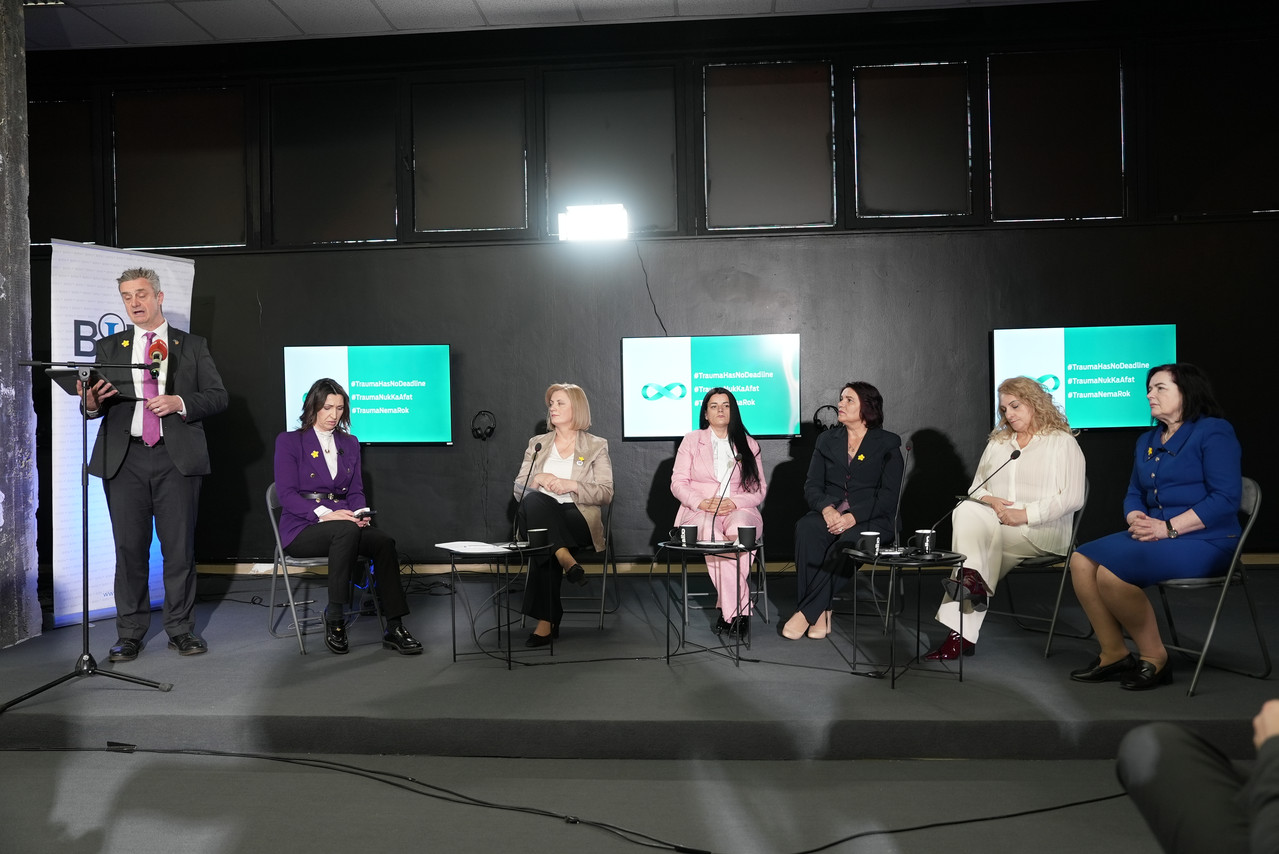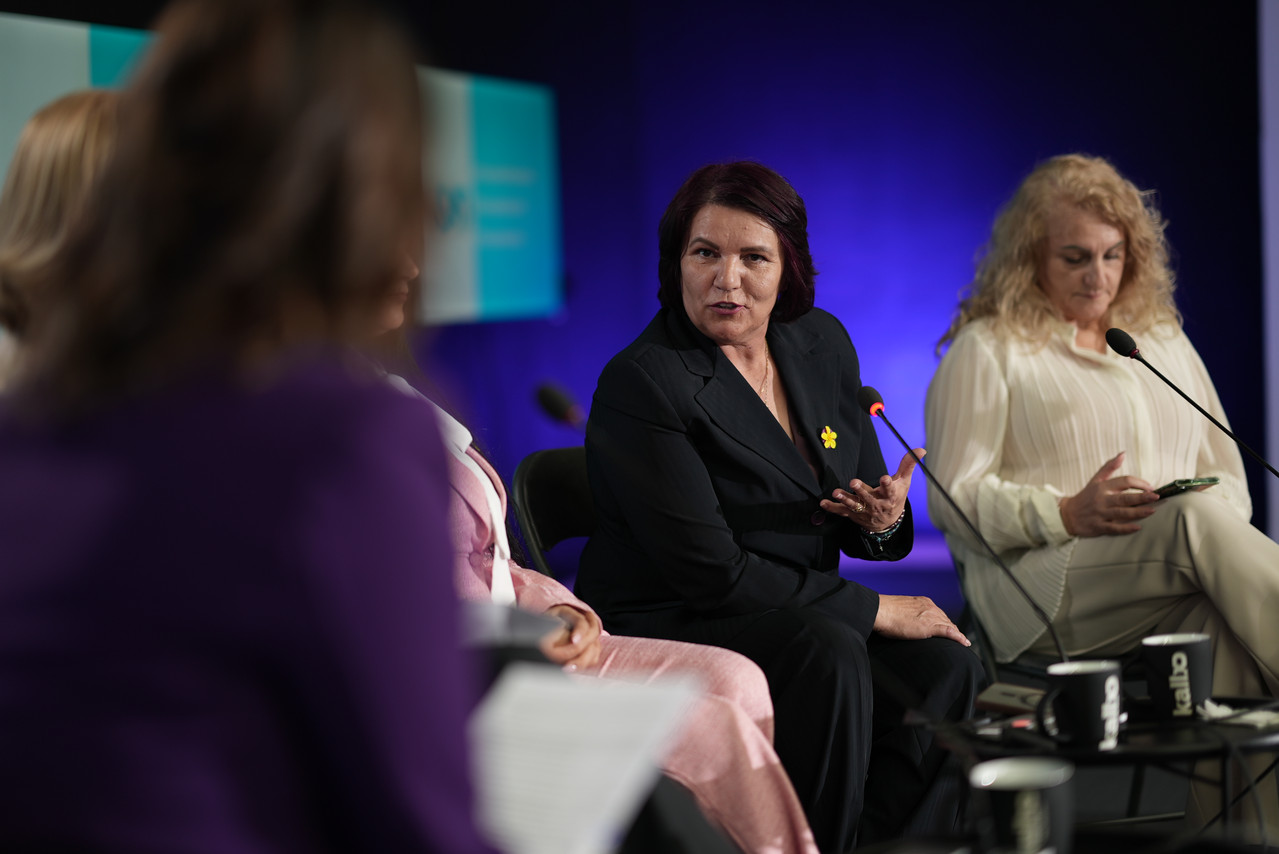Survivors of wartime sexual violence and NGOs have called on the Government of Kosovo to remove application deadlines for victims seeking to come forward and claim official survivor status, while criticizing the work of the victim verification commission.
On Kosovo’s Memorial Day for Survivors of Wartime Sexual Violence, survivors, activists, and diplomats gathered in Prishtina to call for the removal of legal deadlines that restrict survivors from applying for official victim status.
The campaign, titled “Trauma Has No Deadline,“ launched at the Reporting House in Prishtina with BIRN support, on Monday, highlighted the stigma that survivors still face within their families that prevents them from coming out. The campaign urges a shift in how institutions, especially the official commission for verification of the status of wartime sexual abuse victims, approach these sensitive applications.
Prior to the launch of the campaign, Kosovo government postponed the deadline for survivors of wartime sexual violence to appear before the commission and request official victim status by extending the commission’s mandate until May 15, 2028, and the application deadline just to one year prior, on May 15, 2027.
According to current law, May 15, 2025, would be the deadline which had faced widespread criticism, as not all survivors are ready to speak out within pre-established timeframes.
While the government postponement of the deadline was welcomed, survivors and civil society demand for it to be removed completely claiming that survivors should be allowed to come forward when they are ready.
Jonathan Hargreaves, the UK Ambassador to Kosovo, expressed support for removing all time limits on applications for wartime sexual violence survivor status.
“Those still facing intense stigma in Kosovo tell us they can’t speak up based on a timeline. Trauma doesn’t work that way. What we’d like to see is the complete removal of any deadline,” Hargreaves said.
Prior to the discussion and the government’s decision, Ramadan Nishori became the first man to publicly tell his story of surviving sexual abuse during the Kosovo war.
“The shame is not ours, the shame is theirs,” he said referring to the perpetrators. Nishori explained that he managed to finally ask for professional help after he saw Vasfije Krasniqi Goodman, the first survivor to speak about her story publicly.
“A second assault from your own state”

UK ambassador in Kosovo, Jonathan Hargreaves at the launch of ‘Trauma has not deadline’ campaign in Prishtina, Kosovo on April 14, 2025. Photo: BIRN
At the discussion launching the “Trauma Has No Deadline” campaign at Reporting House in Prishtina, Krasniqi-Goodman made a plea to the government to re-evaluate the cases that have been rejected by the review commission.
“This recognition should be permanent. It should not depend on arbitrary deadlines. I urge the government to review those decisions,” Krasniqi-Goodman said.
“Serbia doesn’t acknowledge these crimes. When our own state tells us we lack evidence, it feels like a second rape for every survivor.”
According to official data, out of 2,225 applications submitted for victim status around 360 have been rejected because of a lack of documentation.
“Survivors deserve dignity before the commission. These women often come from families where stigma runs deep. The process needs to reflect that reality.”
Mirlinda Sada, Executive Director at NGO Medica Gjakova called on the government to provide survivors with identification cards recognising them as civilian victims of war. Such recognition would open access to healthcare, tax exemption, and to social housing for those who are kicked out of their homes or are also victims of domestic violence.
“Before 2014, survivors of sexual violence were completely invisible. It was a taboo topic—even for us as organisations. Today, only a small number are able to speak openly.”
“An official ID card for civil victims of war would simplify access to benefits. Right now, they have to present government paperwork declaring them a victim [of sexual abuse]—something many are hesitant to carry.”
Sada added that sexual violence survivors are not treated with the same dignity as other categories of war victims.
“The commission must understand the weight of stigma. Women have told us that when the topic of sexual violence came up, they would leave the room so no one would suspect they had been victims.”
“In Vasfije’s case, the community supported her. But many still said: ‘If this had happened in my family, I would have killed her.’ People support others—but not their own,” she added.
Feride Rushiti, director of the Kosova Rehabilitation Centre for Torture Victims, KRCT, a nominee for 2025 Nobel Peace prize, emphasised that due to the sensitive nature of these crimes, survivors often destroyed medical records and evidence to protect their privacy.
“Because of these barriers, there should be no deadline at all or [additional] requirements for documents. The survivor’s story/narrative should be enough. Many destroyed their documentation out of fear or shame—they didn’t want anyone to know they had been raped.”
Rushiti urged the commission to learn from its mistakes since its founding in 2018 and to center the voices of survivors in its evaluation process.
“We Need a Survivor in the Room”

Shyhrete Tahiri-Sylejmani, survivor of wartime sexual violence at the launch of “Trauma has no deadline” campaign in Prishtina on April 14, 2025. Photo: BIRN
Several speakers raised the urgent need for at least one survivor to sit on the government’s victim status evaluation commission. Shyhrete Tahiri-Sylejmani, a survivor of wartime sexual violence, publicly offered to serve.
“If there isn’t a survivor on the commission, they can’t possibly understand this pain. We need more people working on this. Without justice, we won’t have peace,” she said
According to data from the Youth Initiative for Human Rights, YIHR, around 20,000 people are estimated to have been subjected to sexual violence during the war in Kosovo.
To date, 2,225 people have applied for official recognition of their status as war rape survivors through the government’s Commission to Recognise and Verify Survivors of Sexual Violence During the Kosovo War, but so far only two women have ever spoken publicly about their experiences.





